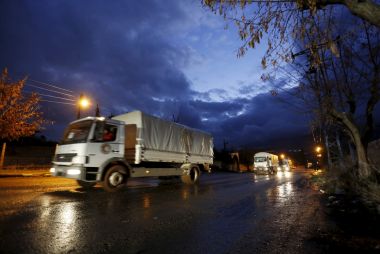A Syrian Archbishop has condemned the use of hunger as a “weapon” in warfare.
“Using hunger, and thirst, as a weapon of war is a crime, a shameful thing,” Archbishop Mario Zenari, the apostolic nuncio to Syria, said.
“I am surprised that the international media is just talking about it now,” he told Asia News. “In some places, people have been dying of hunger for more than a year with lorries full of food, milk, and medicines, just waiting outside.”
Earlier this month, the besieged Syrian town of Madaya made headlines. Held by forces loyal to President Bashar al-Assad, the population of around 30,000 people were starving and humanitarian aid was unable to reach those inside. Two towns in the northern province of Idlib, Foah and Kefraya, and the Yarmouk refugee camp near Damascus are suffering from a similar plight.
“This situation must be solved by eliminating the root cause of the conflict,” Zenari said. The press must “pay more attention to the humanitarian question, a pressing issue that must be resolved today,” he added.
Up to 4.5 million people are living in disputed areas in Syria which are difficult for humanitarian agencies to access, including at least 400,000 in 15 places under siege, according to the United Nations.
Despite admitting that there are logistical challenges, the archbishop said: “there are no excuses because there is food and medicines out there, as well as lorries, yet people are dying of hunger.”
Until a solution to the Syrian crisis is found, “internationally recognised human rights must be guaranteed and respected. The humanitarian problem, the use of hunger – and thirst I would add – is a crime, a shameful thing, as UN Secretary General Ban Ki-moon also pointed out.”
Residents of Yarmouk – a refugee camp just seven miles from the capital – are suffering on a similar scale to Madaya, and an attempt to evacuate the area two weeks ago was unsuccessful.
Zenari commended the efforts of those “working to solve some risky situations”, while emphasising that “the instrumental use of hunger and thirst is inadmissible.”
He praised the work of the United Nations, the Red Cross and the Red Crescent Society, who “have been working steadily and quietly to broker deals to ensure the arrival of aid.”
Source: Christiantoday.com






